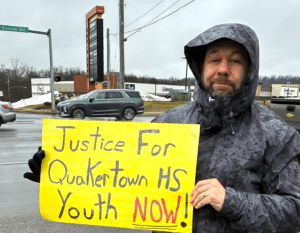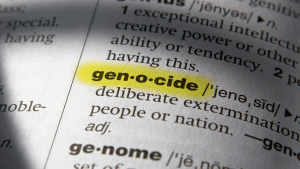Joanna Rosenhein, a Certified Assister for the Pennsylvania Health Access Network (PHAN), spends much of her time assisting residents of Bucks County. She helps folks search for the right health insurance plan through Pennsylvania’s unique Affordable Care Act (ACA) marketplace – better known as Pennie.
Come November first – when open enrollment resumes – Rosenhein can expect to get a lot busier.
In a letter sent to half a million Pennsylvania healthcare exchange customers, the staff at Pennie notified subscribers – 90 percent of whom have a subsidy in the form of a federal tax credit to pay for their health insurance plan. The letter reads, “An expiring federal law will lower your savings through Pennie.”
Currently, one in five Pennsylvanians on the income-based exchange pay less than one dollar for access to healthcare.
The letter goes on to warn, “Based on our records… costs could go up for Pennie enrollees by 82 percent.” That’s on average. For others, it could go up even more or – when new regulations under H.R. 1, A Big Beautiful Bill Act, go into effect – it will be eliminated entirely.
READ: 10 Ways the GOP Budget Will Make Life Worse for Americans
For small business owner, Andrea Deutsch, a Montgomery County pet shop owner and the Mayor of Narberth, her insurance is expected to more than double. “It’s not going to be good. I get about a $700 subsidy. You know I pay my bills, but I don’t make a lot of money doing this. Based on my income, I currently pay a little over $700 a month for my insurance.”
Seven hundred a month is $8,400 annually – not counting out-of-pocket expenses and co-pays. For Deutsch, who predicts that insurance premiums will continue to rise 17 percent next year – in June Governor Shapiro’s office predicted an even higher 19 percent – those increases are unsustainable.
Being priced out of insurance could force Deutsch back into desperation. She remembers being redlined before the ACA, “I had looked everywhere to get health insurance somewhere. No one would touch me because of the diabetes.”
As an insulin dependent type-one diabetic who was diagnosed before all her baby teeth came in, losing insurance could cost her, her business or worse.
Deutsch elaborated, “Doing the math. It’ll be about $1,400 or a little more if I didn’t have a subsidy and they’re talking about an increase next year of upwards of 17 to 20% for insurance. So, if they take away the subsidy…” Deutsch will be expected to pay about $20,000 for access to healthcare.
“For people who are diabetic, it means that they won’t have the same access to take care of a chronic condition and if they don’t take care of it, it gets more expensive.”
According to the Cleveland Clinic, chronic untreated diabetes causes – among other things – kidney disease, gangrene, retinopathy, glaucoma, neuropathy, stroke and death.
Devon Trolley, Pennie’s Executive Director, intends to give consumers every chance to prepare, to make different choices in the exchanges – perhaps pick a less expensive plan.
Still, Trolley expects hundreds of thousands of Pennsylvanians will no longer find any Pennie plan affordable. And the timing couldn’t be worse as seventy-five percent of current Pennie customers have purchased insurance since congress expanded the tax credits.
Trolley explained that the loss of the extended ACA tax credit, “Is devastating to everybody. Enrollment is at record highs in PA.”
Pennie has numbers they’ve never seen before, people using the exchange. People seeing their providers. “It’s at a record and much higher than any number prior to those [tax credits] being extended. Affordability really matters. It’s allowed a lot of people who could not afford the coverage even with those original tax credits to now have access to medical care.”
And Trolley said, that saves lives. “They can find medical conditions early, before they get worse.”
Assister Rosenhein has witnessed this first-hand. “There’s one patient that I worked with who had a high-deductible plan in the past. The deal with the enhanced tax credit was he was able to get a low-cost premium with a very low deductible and out-of-pocket maximum.”
Rosenhein said that these lower costs encouraged him to see his doctor more often. “Because he had a Pennie plan with low co-pays, he was getting his regular checkup, and they did discover that he had cancer.”
Not only was her client diagnosed early, but he could afford treatment. “He’s a small business owner. He’s a graphic designer and wasn’t offered any insurance through an employer, so this was literally life saving for him.”
Rosenhein’s formal title is Consumer Engagement Manager and as such, she swaps hats between helping individuals file pages of online paperwork for either Pennie or qualifying them for Medicaid, which is much easier to access but requires desperately low-income thresholds.
Non-Medicaid qualified customers must be very careful not to incur penalties by improperly reporting their income. Rosenhein explained, “It’s a huge undertaking to apply for health insurance. We have to be very accurate when reporting income. There’s also the plan selection process so there could be close to 100 different plans depending on the area.”
Assisters help consumers choose options based on co-pays, out of pocket requirements, provider networks and premium costs. “It takes a long time to go through all of those different options and make sure that people are getting the most high-quality option.”
Trolley’s busy crunching the numbers and her office is still weighing the impact of H.R. 1, which walks back coverage from many legal residents who are not U.S. citizens. “So we’re projecting it would probably revert back to pre-2021 level.”
And, Trolley says, diminished access to healthcare is bad for Pennsylvania businesses. “We have a lot of small business owners who say that if their health insurance goes up by eighty percent then either they have to shut their small business or they have to push those cost increases out through prices to the local community.”
In all, Trolley says 150,000 will lose insurance when tax credits end. With another hundred thousand or so falling off with H.R.1 – and all those lost patients are bad news for Pennsylvania hospitals. “It’s bad. Bad for people and for hospitals.”
Trolley says, while she doesn’t have a figure, expect healthcare costs to increase for everyone. “There’s really no upside to it. I would say, especially the prices are going to go up more in rural areas. Hospitals in rural areas’ prices are going to go up about double – so almost a full hundred percent just because of the pricing variation that you have across geographies. That is a concern for hospitals because a lot of the rural hospitals in Pennsylvania are financially on edge already.”
Michelle Aliprantis, Regional Director of Marketing and Communications told Bucks County Beacon that, “Lower Bucks Hospital is aware of the recent concerns regarding the potential increase in insurance costs associated with the Pennie program, particularly the possibility of an 82% rise in premiums if Congress does not extend the enhanced federal tax credits set to expire at the end of 2025.”
While acknowledging that Lower Bucks Hospital can’t predict the exact impact either, Aliprantis promised that the leadership of the hospital – recognized just last year for excellence in service to its often diverse and low-income community – will closely monitor the potential impact of patients losing coverage.
Aliprantis added, “Lower Bucks Hospital remains devoted to delivering quality care to our community, regardless of insurance status, and we will continue to evaluate how these developments may impact our patients, families, and the vital safety net that communities in Bucks County rely on.”
People can learn more. Go to Pennie’s website. Those who still qualify must file far more paperwork, far more often. If the insured survive annual renewal applications (H.R.1 eliminated automatic continuation of coverage), everyone from the governor to assisters and healthcare advocates say consumers should brace themselves for enormous increases in premiums.
And while officials at Pennie have been reaching out to consumers, healthcare advocates at PHAN recommend that constituents contact their congresspersons and ask that they preserve the extended credits before the September 30th deadline.
Calls and emails by the Bucks County Beacon to Representative Brian Fitzpatrick’s office, asking if he would support extending the tax credits, were not returned by press time.
As for why the tax credits should be extended, Trolley replied, “When someone has health coverage, they’re healthy enough to work and when they’re working, they are contributing to their community. They’re growing their savings.”
Without coverage? “The reverse. When they’re not healthy, not managing their conditions because they can’t afford coverage, they’re not able to work and then they’re even reliant on government programs. It seems very shortsighted.”







